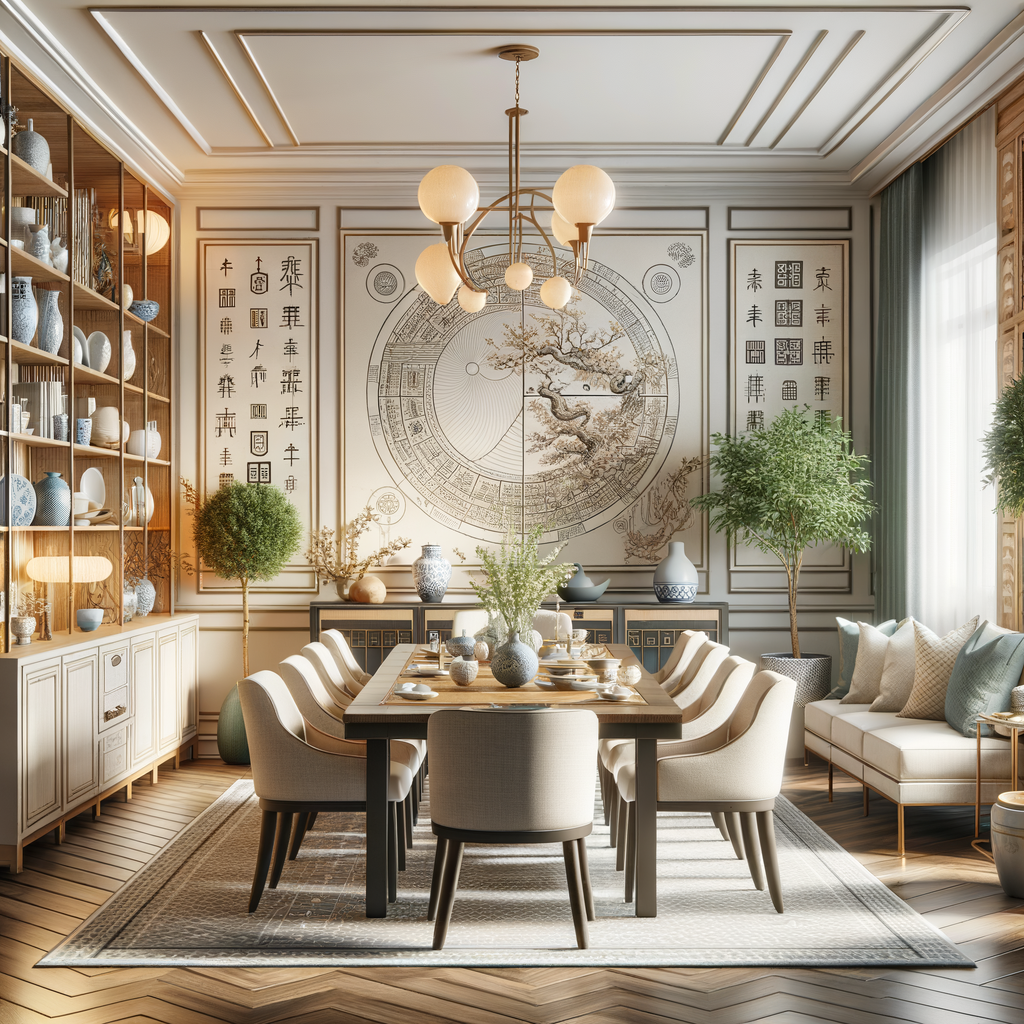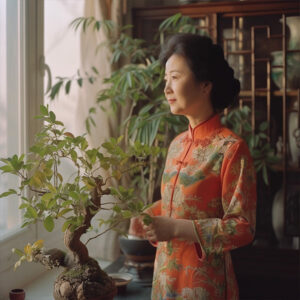
Introduction to Feng Shui for Home
Welcome to the fascinating world of Feng Shui, an ancient Chinese practice that aims to harmonize the energy in your living space. This introductory guide will help you understand the basics of Feng Shui and its importance in home design. So, let’s dive in!
- Understanding the Basics of Feng Shui
- The Importance of Feng Shui in Home Design
Feng Shui, pronounced as “Fung Shway,” is a 3,000-year-old Chinese system of arranging your environment to achieve harmony and balance. The term Feng Shui translates to “Wind” (Feng) and “Water” (Shui), two natural elements that flow and circulate everywhere on Earth. They are also the life force, or Chi, that Feng Shui strives to balance.
At its core, Feng Shui is about the relationship between you and your environment. It’s about aligning your surroundings in a way that supports your good health, happiness, and success. This is achieved by arranging your space to allow the free flow of Chi, or energy.
Why should you consider Feng Shui in your home design? Well, a well-designed home following Feng Shui principles can bring a range of benefits. It can help improve your health, create a relaxing atmosphere, enhance your relationships, and even attract prosperity.
For instance, a clutter-free home allows Chi to flow freely, promoting relaxation and reducing stress. Similarly, the proper placement of furniture can enhance communication and strengthen relationships. Moreover, the correct use of colors and elements can attract good luck and prosperity.
In the following sections, we will delve deeper into how you can apply Feng Shui principles to specific areas of your home, starting with the dining room. So, stay tuned!
Feng Shui Interior Design: The Dining Room
In the world of Feng Shui, the dining room is a place of wealth and abundance. It’s where we gather to share meals, celebrate special occasions, and spend quality time with our loved ones. Therefore, it’s crucial to ensure that this space is designed and arranged in a way that promotes harmony, balance, and positive energy. Let’s delve into the key aspects of dining room layout in Feng Shui.
Dining Room Layout Feng Shui
When it comes to Feng Shui, the layout of your dining room is of utmost importance. It’s not just about where you place your furniture, but also about how the room interacts with natural elements like light and air. Here are some key points to consider:
- Optimal placement of dining room furniture
- Importance of the dining table position
- Role of natural light and windows
According to Feng Shui principles, the dining table should be the centerpiece of the room. It should be placed in a way that it is easily accessible from all sides. Avoid placing it directly in line with the front door as it can disrupt the flow of energy. Also, ensure there is enough space around the table for people to move freely.
The position of the dining table is crucial in Feng Shui. Ideally, it should be placed in the center of the room. This helps in evenly distributing the energy and promotes a sense of balance and harmony. Also, ensure that the table is not placed under a beam or a staircase as it can lead to negative energy.
Natural light plays a significant role in Feng Shui. It’s believed to bring in positive energy and uplift the mood. Therefore, it’s recommended to have large windows in the dining room that allow plenty of natural light. If it’s not possible, consider using mirrors to reflect light and create an illusion of a larger, brighter space.
To sum up, the layout of your dining room can greatly influence the energy flow in your home. By following these Feng Shui principles, you can create a dining space that not only looks aesthetically pleasing but also promotes positivity, harmony, and abundance.
Feng Shui Dining Room Colors
When it comes to Feng Shui, the colors you choose for your dining room can have a significant impact. The right color palette can create a harmonious and balanced atmosphere, while the wrong colors can disrupt the energy flow. Let’s delve into the importance of choosing the right color palette and the impact of colors on the dining room energy.
- Choosing the right color palette
- Impact of colors on the dining room energy
In Feng Shui, each color represents a different element and has a unique energy. For instance, blue represents water and promotes tranquility, while red represents fire and stimulates appetite. Therefore, it’s crucial to choose a color palette that aligns with the energy you want to create in your dining room.
Here’s a simple guide to help you choose the right color palette:
| Color | Element | Energy |
|---|---|---|
| Blue | Water | Tranquility |
| Red | Fire | Stimulation |
| Green | Wood | Growth |
| Yellow | Earth | Stability |
| White | Metal | Purity |
Remember, balance is key in Feng Shui. So, try to incorporate a mix of colors that complement each other and create a balanced energy flow.
The colors in your dining room can significantly influence the energy of the space. For example, warm colors like red and orange can stimulate conversation and appetite, making them ideal for a dining room. On the other hand, cool colors like blue and green can create a calming and relaxing atmosphere.
It’s also important to consider the lighting in your dining room. Natural light can enhance the energy of certain colors, while artificial light can alter the appearance of colors. So, make sure to choose colors that work well with the lighting in your dining room.
Feng Shui Dining Room Decor
Decorating your dining room with Feng Shui principles in mind can bring harmony and balance to your space. Let’s explore two key elements of Feng Shui decor: artwork and plants.
- Selection of Artwork and Decor Items
Artwork plays a significant role in Feng Shui. It’s not just about beautifying your space; it’s also about creating a positive energy flow. The images you choose should inspire happiness, tranquility, and abundance.
When selecting artwork for your dining room, consider pieces that depict food, nature, or scenes of abundance. These can help stimulate a sense of gratitude and contentment during meals. Avoid artwork that depicts violence, loneliness, or any negative emotions.
Decor items can also enhance the Feng Shui of your dining room. Crystal bowls, for example, can help to circulate energy, while mirrors can reflect and double the abundance.
- Role of Plants in Feng Shui
Plants are a powerful tool in Feng Shui. They represent growth, health, and vitality, and can help to balance the energy in a room. In the dining room, plants can also symbolize abundance and prosperity.
When choosing plants for your dining room, go for ones with rounded leaves, as they are believed to bring good luck. Some Feng Shui-friendly plants include jade plants, peace lilies, and rubber plants. Avoid plants with thorny or spiky leaves, as they can create negative energy.
Remember to place your plants in the east or southeast corner of your dining room, as these areas are associated with health and wealth in Feng Shui.
In conclusion, the right artwork and plants can significantly enhance the Feng Shui of your dining room, creating a space that is harmonious, balanced, and inviting.
Feng Shui Dining Room Rules
Creating a dining room that is both functional and inviting can be a challenge. However, by following a few simple Feng Shui rules, you can create a space that promotes harmony and well-being. Let’s explore these rules in detail.
Applying Feng Shui Principles in Dining Room
Feng Shui, an ancient Chinese practice, is all about balancing energy in a space. By applying Feng Shui principles in your dining room, you can create a positive environment that promotes good health, happiness, and prosperity. Here are two key principles to consider:
- Importance of clutter-free space
- Significance of mirrors in dining room
Clutter can disrupt the flow of energy in a room. In Feng Shui, it’s believed that clutter can cause negative energy or ‘Chi’ to stagnate. This can lead to feelings of stress and unease. Therefore, it’s important to keep your dining room tidy and clutter-free. Regularly clear away dishes, wipe down surfaces, and ensure that everything has its place. This will help to create a calm, inviting space where you can enjoy your meals.
Mirrors are a powerful Feng Shui tool. They can reflect and multiply the positive energy in a room. In a dining room, a well-placed mirror can reflect the food on the table, symbolizing abundance and wealth. However, be careful with the placement. Avoid placing a mirror where it reflects clutter or unwanted items. The mirror should only reflect positive images to enhance the energy of the room.
By following these Feng Shui dining room rules, you can create a space that not only looks good but also feels good. Remember, the key to successful Feng Shui is balance. So, take the time to find the right balance for your dining room and enjoy the benefits of a harmonious home.
Case Studies: Feng Shui Dining Room Tips
Let’s delve into real-life examples of how Feng Shui principles can transform your dining room, regardless of its size. We’ll look at two case studies – one for a small dining space and another for a larger dining area.
-
Case Study 1: Transforming a Small Dining Space
Meet Jane, a city dweller living in a compact apartment. Her dining room was cramped and cluttered, making meals less enjoyable. After applying Feng Shui principles, the transformation was remarkable.
First, Jane decluttered her space, removing unnecessary items. She then placed a round table in the room, as Feng Shui suggests that round tables promote unity and equality. She also added a mirror on the wall to reflect the dining table, symbolizing abundance.
Lastly, she used light colors for her walls and furniture, creating an illusion of a larger space. The result? A harmonious and inviting dining area that Jane and her guests love.
-
Case Study 2: Revamping a Large Dining Area
Now, let’s look at John’s case. John lives in a spacious suburban home with a large dining room that felt cold and impersonal. He wanted a warm, inviting space where his family could gather for meals.
John started by positioning his dining table in the center of the room, as Feng Shui recommends. He then added a chandelier above the table to draw focus and create a sense of balance. He also ensured that all family members had a clear view of the door from their seats, as per Feng Shui principles.
John chose warm colors for the walls and added plants to bring in the element of nature. The result was a cozy, welcoming dining room that his family enjoys spending time in.
These case studies show how Feng Shui can transform any dining space into a harmonious, inviting area. Whether you have a small or large dining room, the principles of Feng Shui can help you create a space that promotes unity, abundance, and enjoyment.
Conclusion: Feng Shui Dining Room Furniture Placement
As we come to the end of our journey through the principles of Feng Shui for the dining room, it’s time to recap and reflect on what we’ve learned.
- Recap of Feng Shui principles for dining room
Firstly, we learned that the dining room is a significant space in Feng Shui as it’s where we nourish our bodies and connect with our loved ones. The placement of furniture in this space can greatly influence the flow of positive energy, or ‘chi’.
Our dining room should be well-lit, preferably with natural light, and the colours should be warm and inviting. The dining table should be round or oval, and it should be placed in a way that no one is sitting with their back to a door or window.
We also discussed the importance of decluttering the dining room and keeping it clean and tidy. This helps to keep the energy flowing smoothly. Mirrors can be used to double the abundance, but they should reflect something beautiful and positive.
- Final thoughts on Feng Shui dining room layout
Applying Feng Shui principles to your dining room layout can create a harmonious and balanced environment. It can enhance the quality of your meals and the time you spend with your family. It’s not just about following rules, but about creating a space that feels good and supports your well-being.
Remember, the key to successful Feng Shui is intention. When you arrange your dining room furniture with the intention of creating a positive and nourishing space, you are already practicing good Feng Shui.
So, take a look at your dining room. What changes can you make to improve the flow of energy? Start small and observe the difference. You might be surprised at the positive changes Feng Shui can bring to your home and your life.














